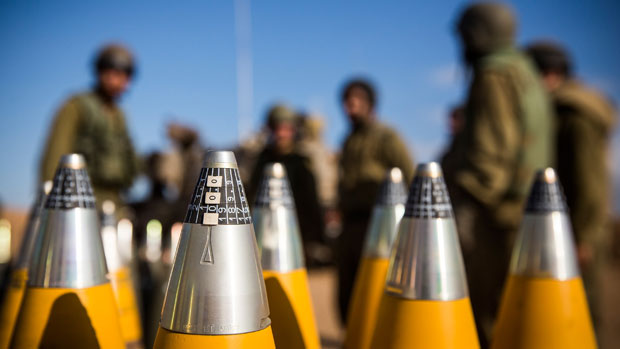Flechette shells: is their use by Israel legal?
Israel accused of using imprecise 'flechette shells', which shower a target with tiny steel darts

A free daily email with the biggest news stories of the day – and the best features from TheWeek.com
You are now subscribed
Your newsletter sign-up was successful
Israel stands accused of using deadly flechette shells in Gaza, a weapon described as illegal under "rules of humanitarian law" by one Israeli human rights organisation.
According to the Palestinian Centre for Human Rights (PCHR), the shells, which shower thousands of tiny darts over a given area, were fired on the village of Khuzaa, east of Khan Younis, on 17 July, The Guardian reports.
The Israel Defence Forces (IDF) did not deny using the weapon, but claimed that all munitions it is using in the Gaza conflict are legal. "As a rule, the IDF only employs weapons that have been determined lawful under international law, and in a manner which fully conforms with the laws of armed conflict," a spokesperson said.
The Week
Escape your echo chamber. Get the facts behind the news, plus analysis from multiple perspectives.

Sign up for The Week's Free Newsletters
From our morning news briefing to a weekly Good News Newsletter, get the best of The Week delivered directly to your inbox.
From our morning news briefing to a weekly Good News Newsletter, get the best of The Week delivered directly to your inbox.
Flechette shells are usually fired by a tank and are designed to explode in the air over a target, showering it with thousands of tiny steel darts around 4cm (1.57 ins) long.
The shells have been used by the IDF before in Gaza, and were ruled to be legal by the Israeli supreme court in 2002. But B'Tselem, an Israeli human rights organisation, says that while they are not expressly forbidden under international humanitarian law the shells carry "a particularly high danger of harming innocent civilians".
Consequently, their use in Gaza must be considered illegal, B'Tselem says, because "one of the most fundamental principles is the obligation to distinguish between those who are involved and those who are not involved in the fighting, and to avoid to the extent possible injury to those who are not involved. Deriving from this principle is the prohibition of the use of an imprecise weapon which is likely to result in civilian injuries".
The reports of flachette shells emerged as Gaza experienced its bloodiest day since the conflict began on 8 July, as more than 100 Palestinians and 13 Israeli soldiers were reported killed. Another 20 Palestinians have been killed in strikes today, the BBC reports, 16 of them in southern Gaza.
A free daily email with the biggest news stories of the day – and the best features from TheWeek.com
In 2008 and 2009, the IDF used artillery shells containing white phosphorous in civilian areas of Gaza. Human Rights Watch said the deployment of the weapon was evidence of war crimes.
-
 Democrats push for ICE accountability
Democrats push for ICE accountabilityFeature U.S. citizens shot and violently detained by immigration agents testify at Capitol Hill hearing
-
 The price of sporting glory
The price of sporting gloryFeature The Milan-Cortina Winter Olympics kicked off this week. Will Italy regret playing host?
-
 Fulton County: A dress rehearsal for election theft?
Fulton County: A dress rehearsal for election theft?Feature Director of National Intelligence Tulsi Gabbard is Trump's de facto ‘voter fraud’ czar
-
 Epstein files topple law CEO, roil UK government
Epstein files topple law CEO, roil UK governmentSpeed Read Peter Mandelson, Britain’s former ambassador to the US, is caught up in the scandal
-
 Iran and US prepare to meet after skirmishes
Iran and US prepare to meet after skirmishesSpeed Read The incident comes amid heightened tensions in the Middle East
-
 Israel retrieves final hostage’s body from Gaza
Israel retrieves final hostage’s body from GazaSpeed Read The 24-year-old police officer was killed during the initial Hamas attack
-
 China’s Xi targets top general in growing purge
China’s Xi targets top general in growing purgeSpeed Read Zhang Youxia is being investigated over ‘grave violations’ of the law
-
 Panama and Canada are negotiating over a crucial copper mine
Panama and Canada are negotiating over a crucial copper mineIn the Spotlight Panama is set to make a final decision on the mine this summer
-
 Why Greenland’s natural resources are nearly impossible to mine
Why Greenland’s natural resources are nearly impossible to mineThe Explainer The country’s natural landscape makes the task extremely difficult
-
 Iran cuts internet as protests escalate
Iran cuts internet as protests escalateSpeed Reada Government buildings across the country have been set on fire
-
 US nabs ‘shadow’ tanker claimed by Russia
US nabs ‘shadow’ tanker claimed by RussiaSpeed Read The ship was one of two vessels seized by the US military